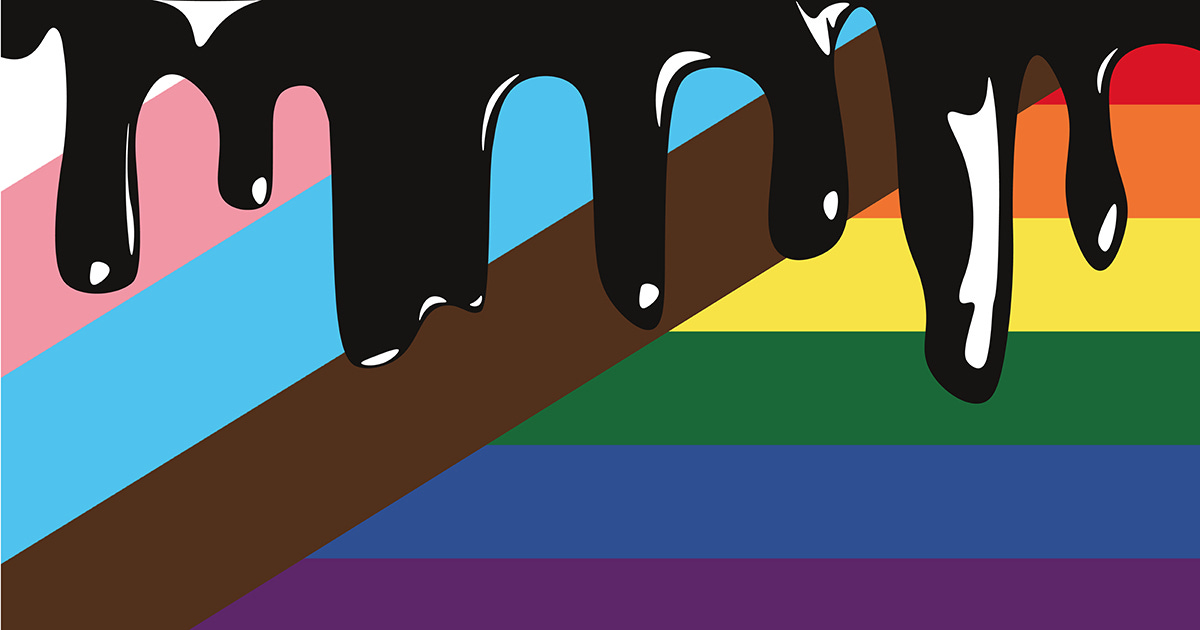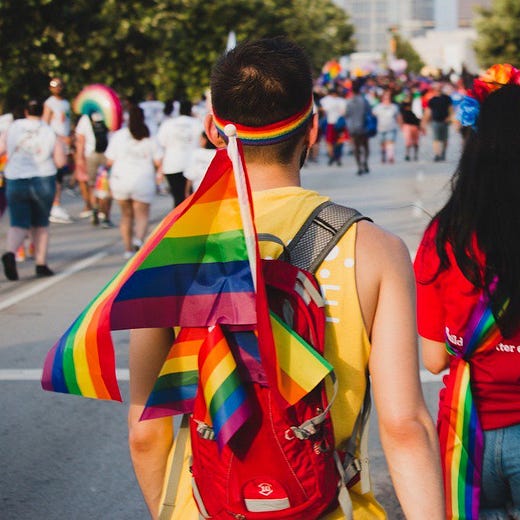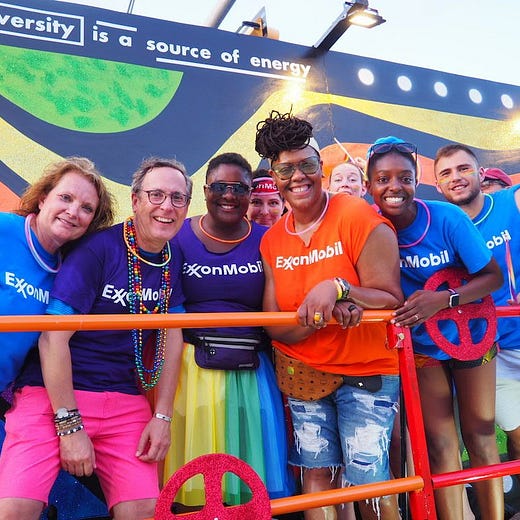Exxon shows its true colors for Pride Month
Exxon cited the need to maintain “neutrality” as justification for its new position banning LGBTQ+ pride and Black Lives Matter flags outside its offices.
Emily Sanders is the Center for Climate Integrity’s editorial lead. Catch up with her on Twitter here.
It turns out that climate action isn’t the only thing Exxon lies about supporting. A new policy at ExxonMobil will prohibit employees from flying “external position flags,” such as the LGBTQ+ pride and Black Lives Matter flags, outside company offices, as first reported by Bloomberg. Yes, they went there.
The policy harkens back to an older, more outwardly cruel Exxon, which openly fought not only climate science but also gay rights. After the company merged with Mobil in 1999, it rescinded Mobil’s policies prohibiting discrimination based on sexual orientation and providing benefits to same-sex couples.
But Exxon’s stance appeared to have improved in recent years. In 2008, LGBTQ+ employees and allies were officially recognized by Exxon as a resource group called PRIDE, which currently includes 3,000 employees worldwide, advocates for rights, recognition, and visibility of LGBTQ+ employees. In 2014 and 2015, respectively, Exxon restored benefits for same-sex couples and protective language for LGBTQ+ employees. The year after that, it added equal health coverage for transgender employees, according to Bloomberg.
But amid a terrifying push to tear down LGBTQ+ gains nationwide, including Florida’s new “Don’t Say Gay” law and Florida Governor Ron DeSantis’s recent retaliation against Disney for opposing that law, Exxon’s justification that it is banning the Pride flag in order to “maintain neutrality” sends a dangerous and disturbing signal.
Like its Big Oil peers, Exxon has built a record of using issues of concern to the public — like climate change or LGBTQ+ equality — to promote an image of itself as a caring, pro-active company. Behind the scenes, it’s a different story.
Employees are taking a stand against Exxon’s hypocrisy. In an email from Exxon’s PRIDE Houston Chapter obtained by Bloomberg last week, members said they would not be representing the company this year at the city’s June Pride celebration. Since 2015, the company had sent members of the group to the event, decked out with rainbow flags and ExxonMobil PRIDE shirts — but now employees are refusing to participate.
“It is difficult to reconcile how ExxonMobil recognizes the value of promoting our corporation as supportive of the LGBTQ+ community externally (e.g. advertisements, Pride parades, social media posts) but now believes it inappropriate to visibly show support for our LGBTQ+ employees at the workplace,” said Exxon’s Houston PRIDE chapter in its email.
Houston will soon be home to Exxon’s headquarters — and, if Lt. Gov. Dan Patrick gets his way, a Texas version of the “Don’t Say Gay” bill.
“Flying a Pride flag is one small way many corporations choose to visibly show their care, inclusion and support for LGBTQ+ employees,” the PRIDE group continued “These types of visible actions are even more impactful for many of our LGBTQ+ colleagues who aren’t out at work and may not feel comfortable participating in PRIDE events.”
The company’s new policy isn’t just a backslide — it’s another window into the gap between Exxon’s rhetoric and reality.
Exxon has been promoting its supposed allyship with LGBTQ+ employees for years. Every Pride Month, the company takes to social media with rainbows galore, testimonials from employees advertising Exxon’s commitments to diversity and inclusion, and photos of its PRIDE group boasting company logos in celebration.
The images allow Exxon to pretend, yet again, to be a socially responsible company. But that “allyship” is only as meaningful as the policies that back them up, regardless of political winds. It’s a mantra we know all too well from the company’s aggressive promotion of its hollow climate commitments, which tend to increase whenever it looks like the nation might actually do something about the climate crisis.
Like the polluter’s much ridiculed algae biofuels PR campaign, it seems clear that Exxon was using rainbow flags as cover — at least, when it looked like political cover was necessary. Just last year, the company gave more than $36,000 to the sponsors of an Arkansas law that would have rescinded access to medical care for transgender youth and punished their medical providers — until it was blocked in court. Now, with Texas lawmakers pushing their own version of Florida’s “Don’t Say Gay” bill, the company is beginning to walk back its public support of LBGTQ+ equality, while trying to pass off this reversal as “neutral.”
On Saturday, the PRIDE employee resource group’s executive sponsor and President of ExxonMobil’s Technology and Engineering division, Linda DuCharme, gaslit staff by telling them (and posting on Linkedin) that she was “crushed”... not by the new policy itself, but that employees were hurt by it.
She wrote that Exxon’s recent decision is “in no way intended to diminish its commitment to an inclusive and diverse culture, or our full support for all LGBTQ+ employees,” but neglected to commit to any action to ease their hurt.
Exxon is a corporation that will, at the end of the day, act in what it perceives to be the best interests of its shareholders and executives — as it always has, regardless of how it advertises itself, or of its impact on people, the planet, or its own employees. Ultimately, if in the year 2022 Exxon views Black Lives Matter and LGBTQ+ equality as “external positions” on which it needs to maintain “neutrality,” well… need any more be said?
PS: A reminder that Part 2 of PBS Frontline’s docuseries, The Power of Big Oil, is now streaming. Please watch and share! And read our review of Part 1 here.
ICYMI News Roundup
Environmental Lawyer Targeted by Chevron Freed After More Than Two Years Under House Arrest
What Elon Musk Buying Twitter Could Mean for Climate Disinformation
Biden's Latest Oil & Gas Drilling 'Compromise' Is a Head-Scratcher
A Government Scientist Warned About Climate Change in 2001. Exxon Mobil Sought to Have Him Removed.






